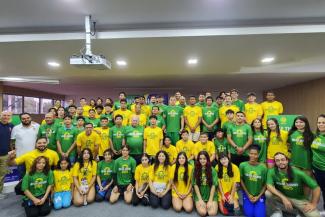Saudi Wrestling Federation growing wrestling through education
Monday, October 14, 2024 - 11:40 By United World Wrestling Press

RIYADH, Saudi Arabia (12 October) – The Saudi Wrestling Federation has been organizing coaching and referee courses to grow and develop wrestling within their country over the past few years. Their hard work led to their first-ever silver medal at the U20 Asian Championships. Manthr Jndu achieved this at 63kg in Greco-Roman.
In late April, they organized two more courses (Level 1 Coaching Course and Introduction to Refereeing Course) for new coaches and referees. The Saudi Wrestling Federation held these courses in partnership with United World Wrestling.
Mr. Hassan MADANY (EGY) and Mr. Juan Luis MAREN (CUB) conducted the Level 1 Coaching Course, and Mr. Sherif HALAWA (EGY) and Mr. Mohsen YAMANI (KSA—Chief of Saudi Referees) led the Introduction to Refereeing course. The courses were held from 28 April to 2 May and included 91 participants (22 women) from 8 nationalities, including participants from EGY, MAR, SYR, SUD, NGR, JOR, KGZ, and KSA residing in Saudi Arabia.
The coaching course had 71 participants, including 17 women coaches. The Level 1 Course is the Introduction to Coaching and Safety. During the course, the participants participated in theoretical and practical sessions. Some of the topics covered were discovery games, introducing a new technique, coaching skills, giving feedback, risk management, age, and developmental stage characteristics. The coaches actively practiced and developed their skills during the course through practical evaluations. Overall, the coaches gained important knowledge and skills to help them improve in their role as coaches.
The Introduction to Refereeing Course had 20 participants, including 5 women referees. The participants learned the foundations of what it takes to be a great referee. The areas covered during the course included the safety of the athletes, evaluation of holds, referee mechanics, positioning, and controlling the bout. The participants were active during the course and could practice their skills through practical evaluations.
During the courses, there were sessions involving both referees and coaches, led by Mr. Halawa. This allowed both groups to work together and better learn wrestling rules.


Share your thoughts.
Comments